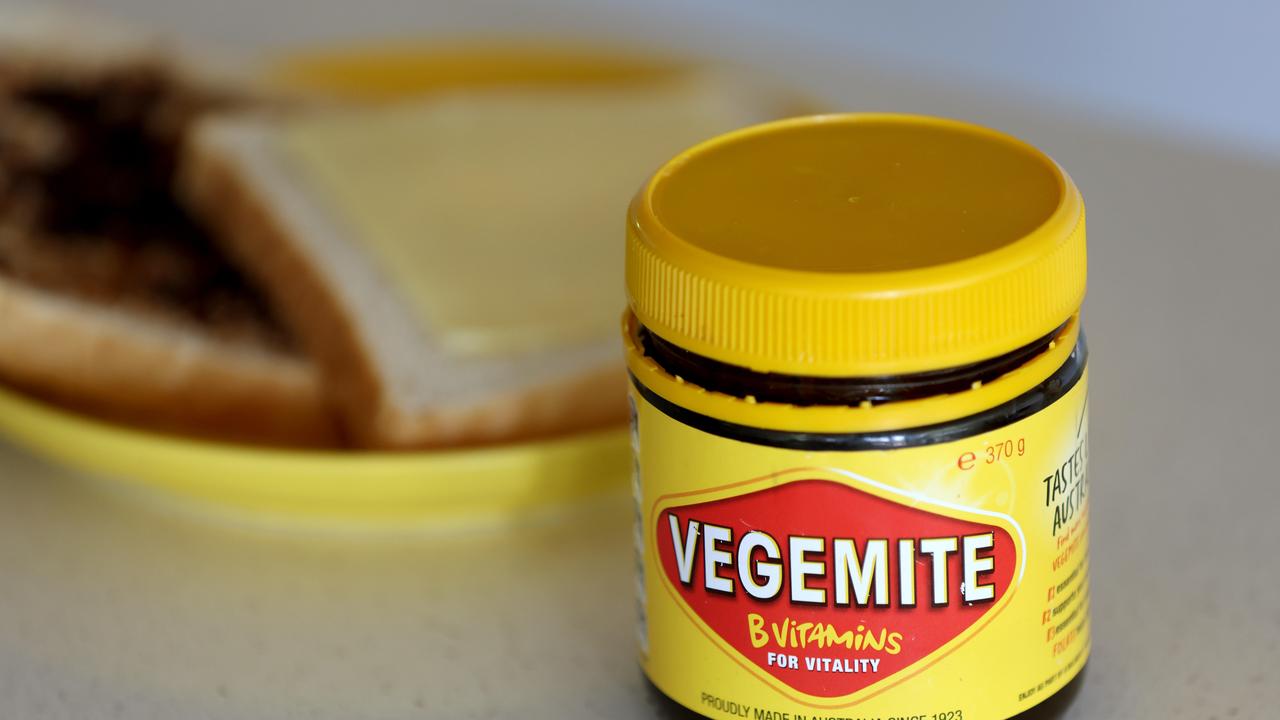Jaw-dropping sight from window of luxury Rocky Mountaineer
Trains actually slow down so passengers can get a glimpse of this rare sight, deep in some of the most rugged terrain on earth.
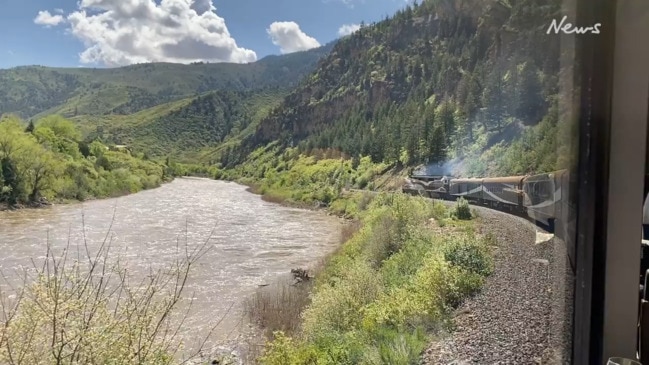
It’s a sight said to be so astonishing, our train actually slows to a crawl so we can get a good look.
A few hours outside Vancouver, as we wind through the increasingly rugged terrain of western Canada towards Jasper, we pass the meeting point of the mighty Thompson and Fraser rivers.
On paper, this doesn’t sound like a particularly thrilling attraction. But as we peer out the train’s left window, it’s clear why our on-board hosts have told us to get our cameras ready.
The two rivers are different colours: the Thompson River is a translucent green-blue, while silt turns the Fraser murky and brown. When they meet, the rivers hold their form and rush in extraordinary, bicoloured parallel, turning one half of the water blue, the other half brown.
We’re deep in the Canadian wilderness, and we’d have never seen this rare phenomenon — and many other equally spectacular ones — if we weren’t on the Rocky Mountaineer train.
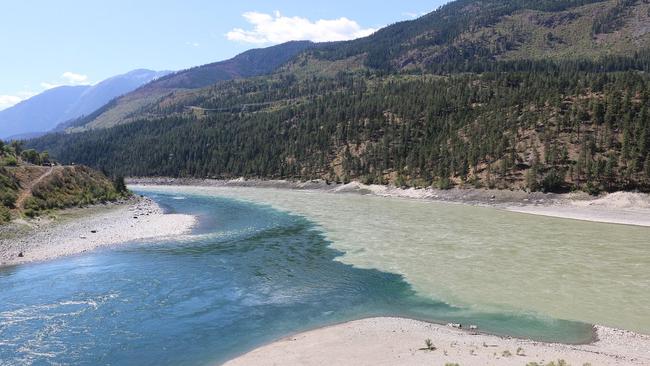
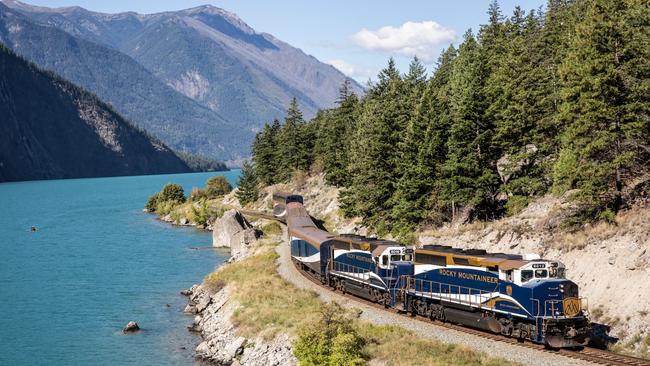
The Rocky Mountaineer’s three Canadian routes take sightseers through the rugged western provinces of British Columbia and Alberta to iconic spots like Whistler, Banff, Jasper and Lake Louise, and the American Rockies on a US route.
We’re on the two-day Journey Through the Clouds service from Vancouver to Jasper, in the heart of the Rockies, with an overnight stop in Kamloops. It is, all up, more than 22 hours of rail travel across both days. But time passes astonishingly quickly when you have so much to marvel at – both outside and on-board the opulent train.
The Rocky Mountaineer’s panoramic windows set it apart from any tourist train you’d have seen. In the premium GoldLeaf coach, huge windows stretch up towards a domed glass roof. We also have an observation deck, and every now and then we peel ourselves out of our comfy leather seats and venture to the deck for a cool blast of mountain air and the scent of Douglas firs as the train whips past.
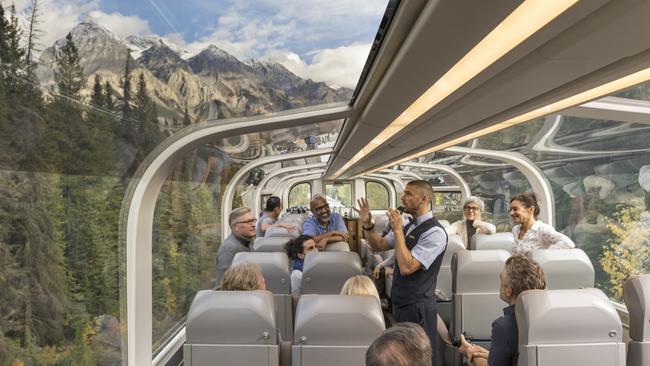
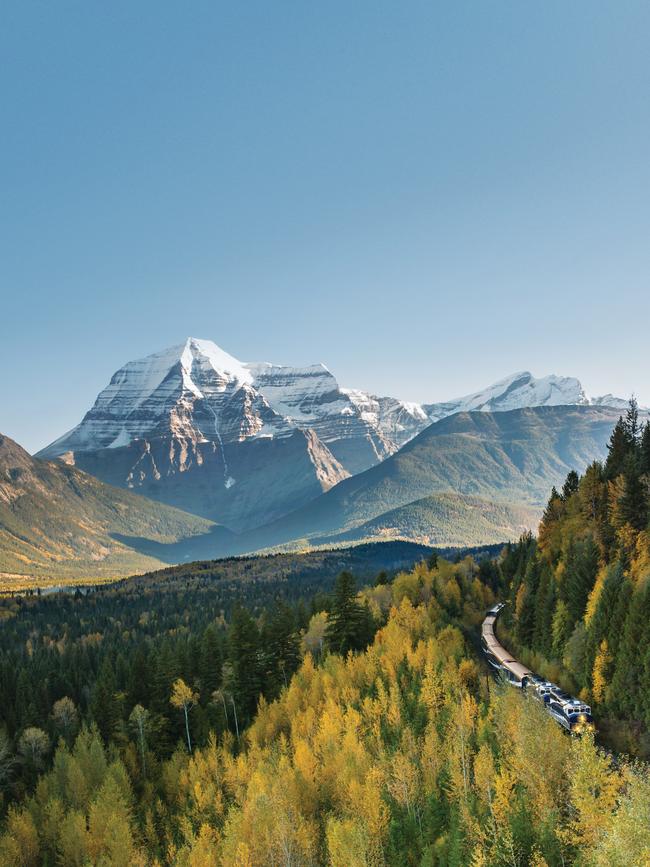
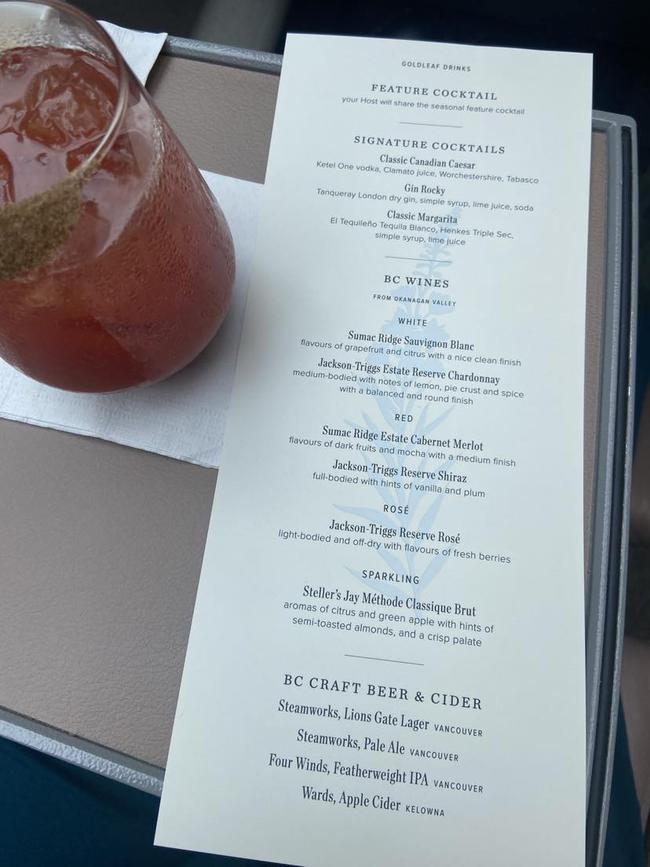
When they’re not serving us drinks and snacks (all-inclusive in GoldLeaf class), our two on-board hosts keep us updated on notable landmarks along the journey: Hells Gate, the notorious narrowing of the Fraser River that terrified European explorers; Rainbow Gorge, where minerals have left colourful streaks in the craggy rock; a huge, 100-year-old osprey nest perched on a bridge; the best photo opportunity for Mount Robson, the Rockies’ highest peak.
Train manager Sean Richard has been with Rocky Mountaineer since 2018 and finds the sights that draw the biggest gasps are the ones guests don’t expect.
“Before you come into Black Canyon (near Hells Gate, on the Fraser River), there’s wide, sweeping curves and you can see the whole train, and the locomotive up front, as you come into the canyon. That’s a really spectacular part of the trip,” he tells news.com.au.
“If you’re not from here you might not even know those sections of beauty exist.”
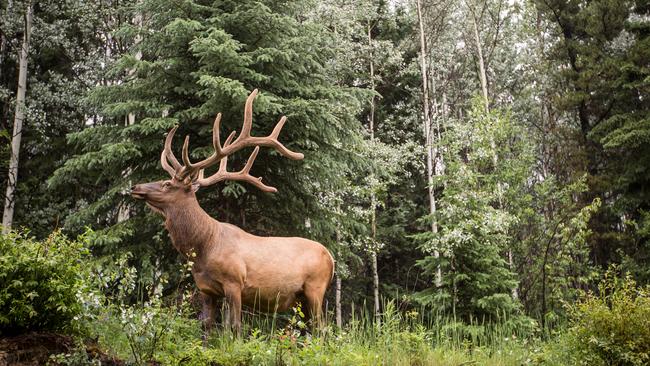
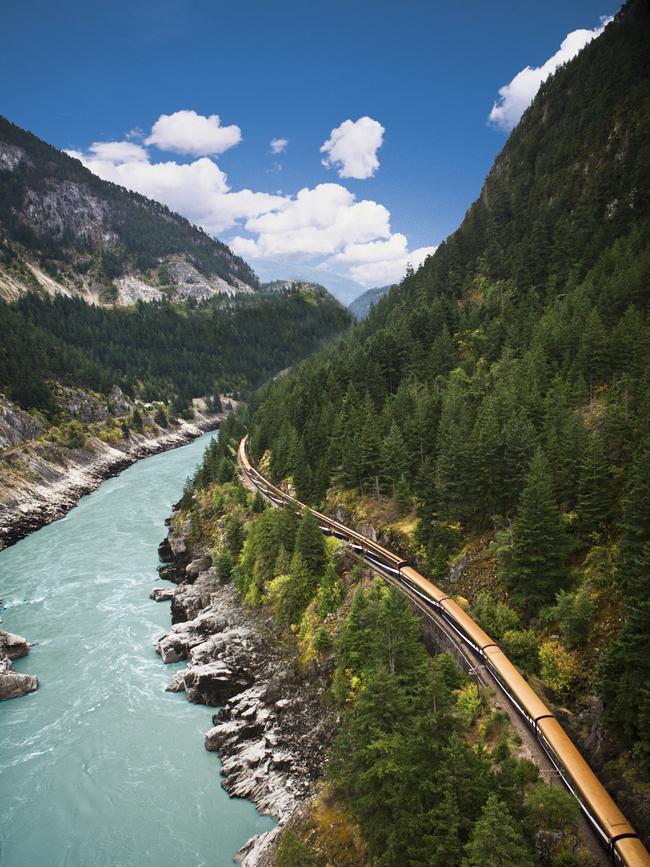
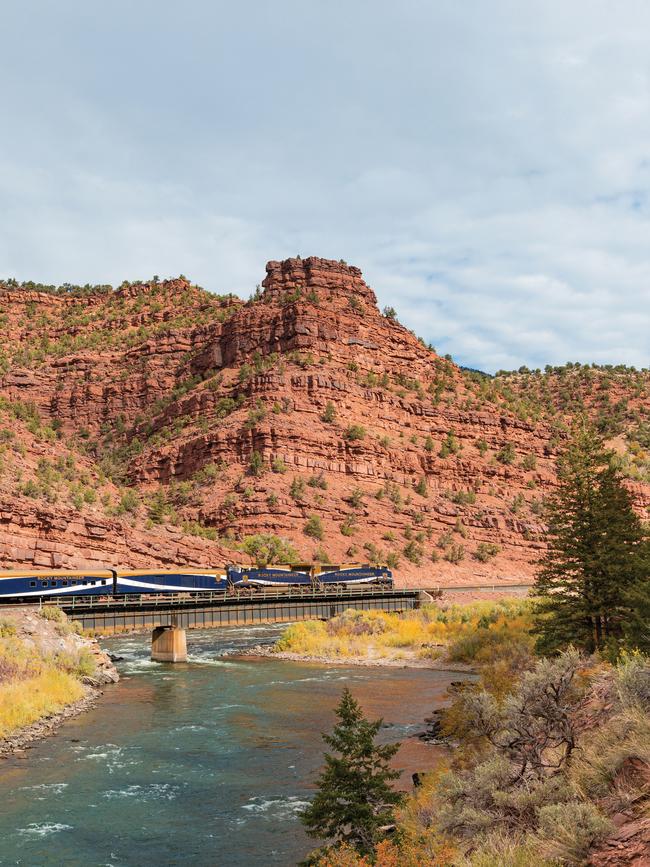
Everyone’s heard of Banff and Jasper but the lesser-known Fraser Canyon region is “really breathtaking”, Mr Richard said. “Guests are genuinely moved by the beauty there.”
As our train rolls on, the landscape evolves dramatically. We see lush, scenic valleys and rocky, lunar-like terrain, turbulent rivers and still, magnificent lakes. The snow-capped Rockies loom ever-larger as we venture deeper into mountain territory towards Jasper.
Then there is the wildlife. Using earpieces, hosts in each carriage tip each other off about upcoming animal sightings — elk, deer, coyotes, bald eagles — so they can tell passengers to get their cameras ready.
Word of wildlife sightings spreads down the carriages faster than the speed of the train itself. And there’s one kind of animal everyone wants to see.
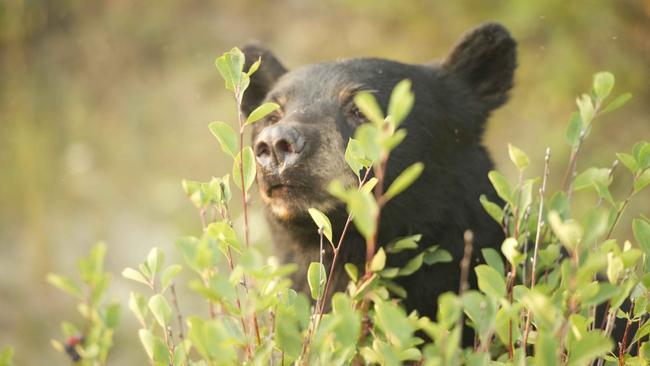
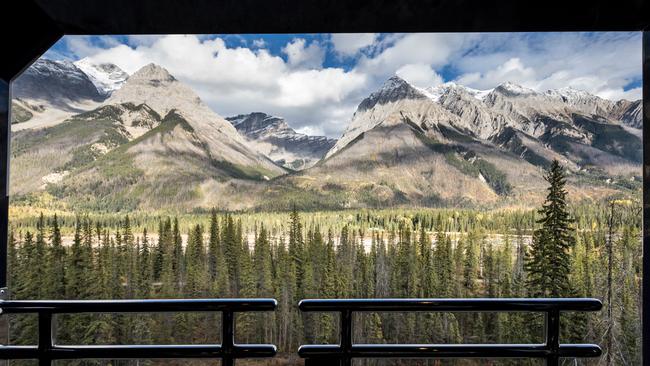
“The bears get people really, really excited, no question about it,” Mr Richard says.
“We don’t see a lot of bears right outside Vancouver, but when you get close to the national parks, (the crew) are a little more attentive.
“In the fall when the salmon are running, down on the Eagle River, there’s a spot where the river meanders close to the tracks and you can see bears fishing for salmon. That is about as good a shot as you can get.”
As we’re spellbound by views from our seats on the upper level of our coach, in the galley below us, chefs are preparing our next gourmet meal service in what I imagine to be fairly dicey conditions.
The train is, after all, rattling along at speeds that reach 90km/h.
“We always need a place to hold on,” Rocky Mountaineer’s executive chef Kaelhub Cudmore says.
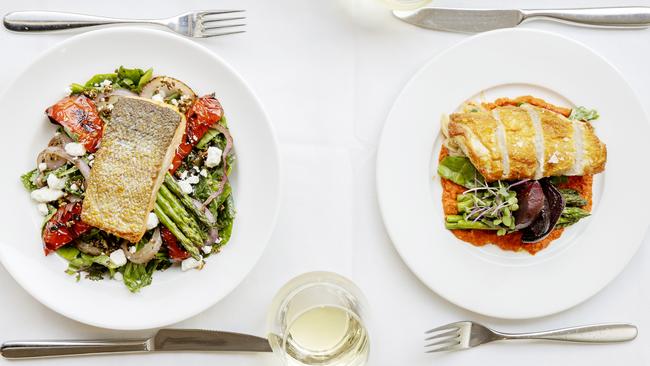
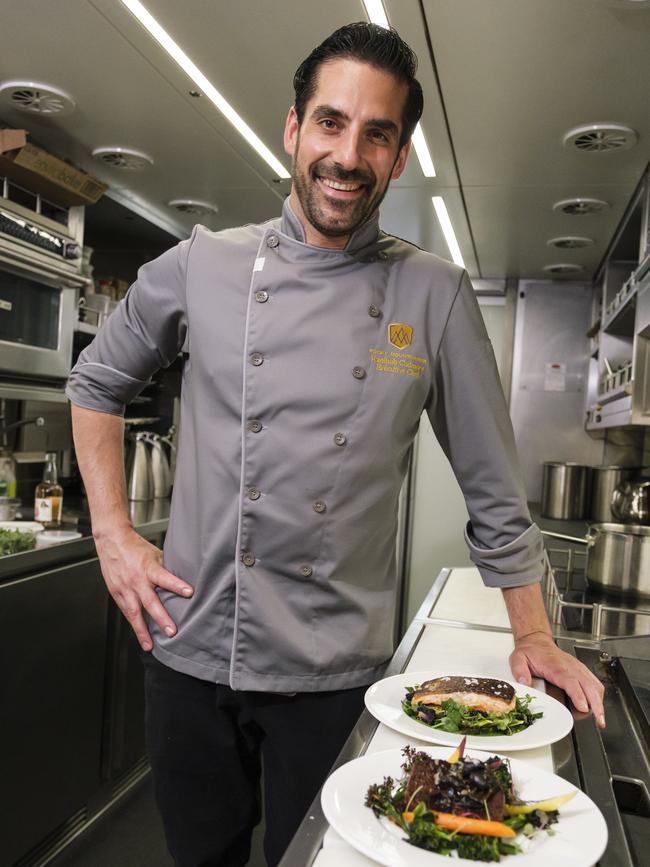
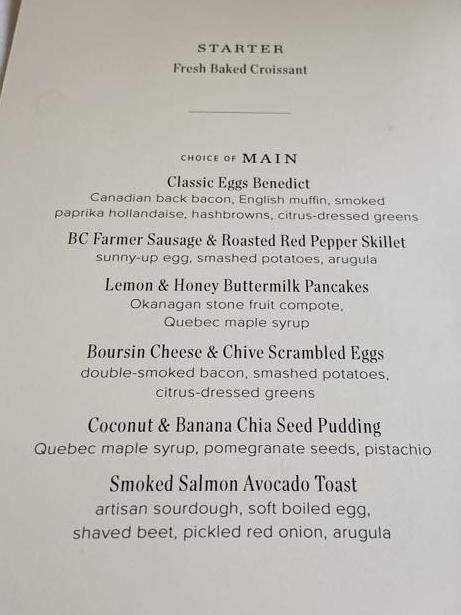
“We need to write the menu around techniques that don’t require too much delicate intricacy.
“Our space is very finite down there. It’s just enough room for three people to work comfortably, and just enough room to store food for a couple of days.”
There’s a galley in each carriage, with three chefs in each. In SilverLeaf, guests are served meals at their seats but in GoldLeaf we get our own dining room, white tablecloths and all.
We’re served breakfast (pastries and main dishes) and lunch (mains and dessert) on both days of our journey, and the gourmet menus lean heavily on local produce — tuna from Vancouver Island, salmon and steelhead trout from Lois Lake, chicken from the Fraser Valley, beef from Alberta.
“Our goal is to really bring in the areas we’re travelling through into these meals and express the regions through the food,” Mr Cudmore says.
“The menu varies quite purposefully with the products that we have on hand and the climates we’re travelling through.”
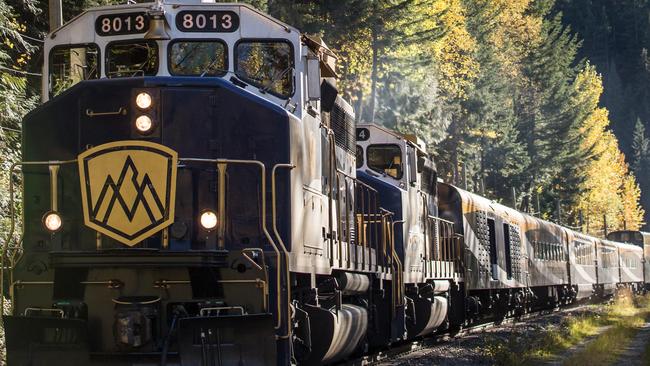
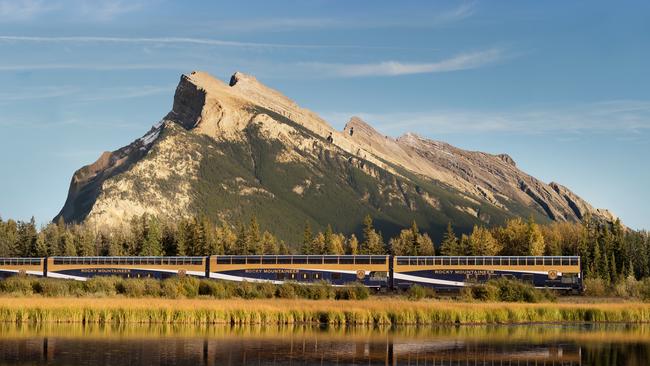
Upstairs, back at our seats, the luxury experience continues. There are unlimited snacks and drinks, including British Columbia wines and bespoke cocktails.
The Rocky Mountaineer is not a sleeper train — though the reclining, heating leather seats do make for a lovely mid-journey snooze — and when we reach Kamloops after our first day of travel, we check into hotels for the night. We’re delighted to discover our stowed luggage waiting for us in our rooms. We barely need to lift a finger. Our every need is catered for, all part of the service.
Our second day is spent much like the first: revelling in the luxury service on board, chatting to fellow travellers, kicking back and marvelling at the scenery.
But an hour or so from Jasper, where our Rocky Mountaineer adventure will end, there’s one thing missing: we haven’t yet seen a bear.
That is, until one of our hosts, responding to an urgent alert in his earpiece, yells out, “bear coming up on the right!” and we all fling ourselves to that side of the train.
And there it is, a beautiful black bear, casually strolling alongside the track.
Moments later, our noses still smooshed against the window, we pass another bear.
It’s hard to imagine anything beating this — and we haven’t even reached our destination.
The writer travelled as a guest of the Rocky Mountaineer




